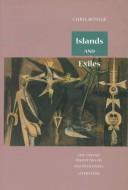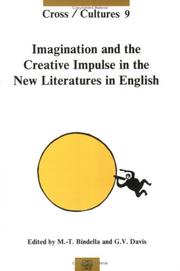| Listing 1 - 4 of 4 |
Sort by
|
Book
ISBN: 1282505173 9786612505171 9042026456 9789042026452 9042026448 9789042026445 Year: 2009 Publisher: Amsterdam New York Rodopi
Abstract | Keywords | Export | Availability | Bookmark
 Loading...
Loading...Choose an application
- Reference Manager
- EndNote
- RefWorks (Direct export to RefWorks)
Aotearoa New Zealand, “a tiny Pacific country,” is of great interest to those engaged in postcolonial and literary studies throughout the world. In all former colonies, myths of national identity are vested with various interests. Shifts in collective Pakeha (or New Zealand-European) identity have been marked by the phenomenal popularity of three novels, each at a time of massive social change. Late-colonialism, anti-imperialism, and the collapse of the idea of a singular ‘nation’ can be traced through the reception of John Mulgan’s Man Alone (1939), Keri Hulme’s the bone people (1983), and Alan Duff’s Once Were Warriors (1990). Yet close analysis of these three novels also reveals marginalization and silencing in claims to singular Pakeha identity and a linear development of settler acculturation. Such a dynamic resonates with that of other ‘settler’ cultures – the similarities and differences telling in comparison. Specifically, Reading Pakeha? Fiction and Identity in Aotearoa New Zealand explores how concepts of race and ethnicity intersect with those of gender, sex, and sexuality. This book also asks whether ‘Pakeha’ is still a meaningful term.
New Zealand literature --- New Zealanders --- Kiwis (New Zealanders) --- Ethnology --- History and criticism. --- Books and reading. --- National characteristics, New Zealand, in literature. --- Duff, Alan, --- Hulme, Keri. --- Mulgan, John, --- English literature

ISBN: 9042014989 9004490574 9789042014985 9789004490574 Year: 2002 Volume: 54 Publisher: Amsterdam : Rodopi,
Abstract | Keywords | Export | Availability | Bookmark
 Loading...
Loading...Choose an application
- Reference Manager
- EndNote
- RefWorks (Direct export to RefWorks)
This book is about the Booker Prize - the London-based literary award made annually to "the best novel written in English" by a writer from one of those countries belonging to, or formerly part of, the British Commonwealth. The approach to the Prize is thematically historical and spans the award period to 1999. The novels that have won or shared the Prize in this period are examined within a theoretical framework mapping the literary terrain of the fiction. Individual chapters explore themes that occur within the larger narrative formed by this body of novels - collectively invoked cultures, social trends and movements spanning the stages of imperial heyday and decline as perceived over the past three decades. Individually and collectively, the novels mirror, often in terms of more than a single static image, British imperial culture after empire, contesting and reinterpreting perceptions of the historical moment of the British Empire and its legacy in contemporary culture. The body of Booker novels narrates the demise of empire and the emergence of different cultural formations in its aftermath. The novels are grouped for discussion according to the way in which they deal with aspects of the transition from empire to a post-imperial culture - from early imperial expansion, through colonization, retrenchment, decolonization and postcolonial pessimism, to the emergence of tribal nationalisms and post-imperial nation-states. The focus throughout is primarily literary and contingently cultural.
Commonwealth fiction (English) --- Imperialism in literature --- Booker Prize --- History and criticism --- History --- Commonwealth countries --- In literature --- Gordimer, Nadine --- Ishiguro, Kazuo --- Keneally, Thomas --- Naipaul, V. S. --- Okri, Ben --- Ondaatje, Michael --- Rushdie, Salman --- Commonwealth fiction (English) - History and criticism --- Booker Prize - History --- Commonwealth countries - In literature --- Common wealth fiction(English) --- Man Booker Prize --- Booker McConnell Prize --- Literary prizes --- Carey (peter), 1943 --- -Coetzee (john maxwell), 1940 --- -Farrell (j.g.) --- Hulme (keri) --- Jhabvala (ruth prawer) --- Roy (arundhati), 1961 --- -Scott (paul) --- Unsworth (barry)

ISBN: 0804732817 0804732809 Year: 1998 Publisher: Stanford (Calif.): Stanford university press
Abstract | Keywords | Export | Availability | Bookmark
 Loading...
Loading...Choose an application
- Reference Manager
- EndNote
- RefWorks (Direct export to RefWorks)
French literature (outside France) --- Sociology of literature --- English literature --- Thematology --- Caribbean Area --- Colonies in literature --- Creole dialects in literature --- Exiles in literature --- Islands in literature --- Literature, Modern --- Postcolonialism in literature --- History and criticism --- Developing countries --- Emerging nations --- Fourth World --- Global South --- LDC's --- Least developed countries --- Less developed countries --- Newly industrialized countries --- Newly industrializing countries --- NICs (Newly industrialized countries) --- Third World --- Underdeveloped areas --- Underdeveloped countries --- Literatures --- History and criticism. --- Caribbean area --- HULME (KERI) --- POST-COLONIAL LITERATURE (ENGLISH) --- CARIBBEAN LITERATURE (ENGLISH) --- CREOLISATION --- COETZEE (JOHN MAXWELL), 1940 --- -CRITIQUE ET INTERPRETATION

ISBN: 9051833105 9004503072 Year: 1993 Volume: 9 Publisher: Amsterdam Rodopi
Abstract | Keywords | Export | Availability | Bookmark
 Loading...
Loading...Choose an application
- Reference Manager
- EndNote
- RefWorks (Direct export to RefWorks)
English literature --- anno 1900-1999 --- Commonwealth literature (English) --- Creativity in literature --- Imagination --- Littérature du Commonwealth (anglaise) --- Créativité dans la littérature --- History and criticism --- Congresses --- Histoire et critique --- Congrès --- 820 <100> --- 820 "19" --- Engelse literatuur: Commonwealth --- Engelse literatuur--20e eeuw. Periode 1900-1999 --- 820 "19" Engelse literatuur--20e eeuw. Periode 1900-1999 --- 820 <100> Engelse literatuur: Commonwealth --- Littérature du Commonwealth (anglaise) --- Créativité dans la littérature --- Congrès --- Littérature anglophone --- Littérature postcoloniale --- MALGONKAR (MANOHAR) --- DHLOMO (H.I.E.) --- HULME (KERI) --- DAVIS (JACK) --- IHIMAERA (WITI), 1944 --- -ACHEBE (CHINUA), 1930 --- -BREYTENBACH (BREYTEN), 1939 --- -COETZEE (JOHN MAXWELL), 1940 --- -ONDAATJE (MICHAEL), 1943 --- -FRAME (JANET), 1924-2004 --- SOYINKA (WOLE), 1934 --- -WALCOTT (DEREK), 1930 --- -BONE PEOPLE, THE
| Listing 1 - 4 of 4 |
Sort by
|

 Search
Search Feedback
Feedback About UniCat
About UniCat  Help
Help News
News